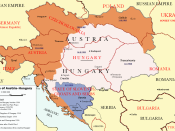Growing nationalism had been building up long before World War I. Along with the citizens of many multi-ethnic nations of Europe who strove towards independence and unity with their brothers, were the Great Powers who wished to extend their hand over the greater part of Europe and save their prestige. By the time the war started, millions of people were inflamed by patriotism and, contrary to those who believe the armament to be the major cause of the war, if the masses hadn't had such great nationalistic sentiment, they would not have rushed to the guns being supplied to them. And no war could take place without the manpower and feeling of purpose. The people were delighted by the chance to prove their nation's superiority and power and greeted the war with open arms. Ethnicity and hurt pride created alliances between nations that would fight side by side and enemies that would cut each other's throats.
The nationalist sentiment of the masses created the combustible atmosphere, and proved to also be the spark which ignited it. This could best be described by a quote from Hitler's thoughts from his book Mein Kampf: " As a boy and young man I had so often felt the desire to prove at least once by deeds that for me national enthusiasm was no empty whim... Thus my heart, like that of a million others, overflowed with proud joy that at last I would be able to redeem myself from this paralyzing feeling..."
1. The rising feelings of nationalism manifested themselves in two major ways. The "power trip" of the great powers of Europe was one. The disputes between France and Germany to control the provinces of Alsace-Lorraine created some anti-German disturbances in 1913. It was protest against the loss of this area to...



Cause of world war one??
This essay may have been better titled "The events leading up to the assisination of Archduke Frances Ferdinand"
The essay itself is quite well written, and is accurate and informative, on the subject that it covers. Which is only a small part of the complicated series of events leading to the 'Great War' It pays no attention to the many and varied interests of the other protagonists, Turkey for example wanted to build her railway line, valuable mineral rights were at stake, and there is little mention of the many treaties that existed between the royal families and heads of state. The Russian Tsar's were aware of dissention and the rumblings of revolution within their land, even the Irish were not without their share of unrest, the Easter Rising of 1916 proved this.
So the 'War to end wars' was about a lot more than nationalist pride in Estern Europe.
0 out of 0 people found this comment useful.